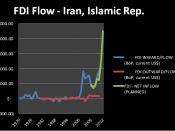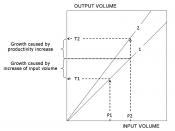Globalisation has had a profound impact on the Japanese economy influencing levels of international trade, business operations, financial flows, government policy, labour markets and even environment. This movement has been driven primarily by numerous TNCs, trade liberalization, and the deregulation of the financial system, and numerous strategies adopted by the Government and Economy, resulting in the creation of a 'new' Japan.
Economic Growth and Development
The Japanese economy, the 2nd largest in the world, accounts for 7.1% Global World GDP, at US$4.6 triliion and a per capita income of approximately US$33,550 (World Bank 2006). As a result of globalisation, literacy levels are at 99% and the general living standards of the Japanese are very high, with an average life expectancy of 80.93 years, an infant mortality rate of 0.33%. The level of income inequality or distribution of family income is relatively equal, at a Gini Index of 24.9, where 100 represents perfect inequality and 0 perfect equality.
Japan is also 9th out of 177 countries on the Human Development Index (HDI).
Generally, and in the past, Globalisation has aided Japan in achieving its rapid economic growth, and poses as the greatest support in the return of the Japanese economy's strength. Real economic growth peeked in the 1960's, with an average of 10%, 5% in the 70's and 4% in the 80's. Despite this, Globalisation has also negatively affected Japan's economic growth. Growth slowed in the 1990's due to the collapse of the "bubble economy" and consequences arising from overinvestment and contractionary domestic policies intended to wing speculative excesses for the stock and real estate markets. Japan has suffered deflation of 0.3%, rising unemployment of 5.5%, reduced GDP (0.4% in 2001 and 0.2% during 2002) and as of 17/11/08, Japan was officially declared in a recession, with a fall of...


